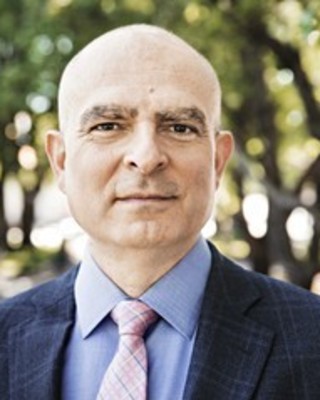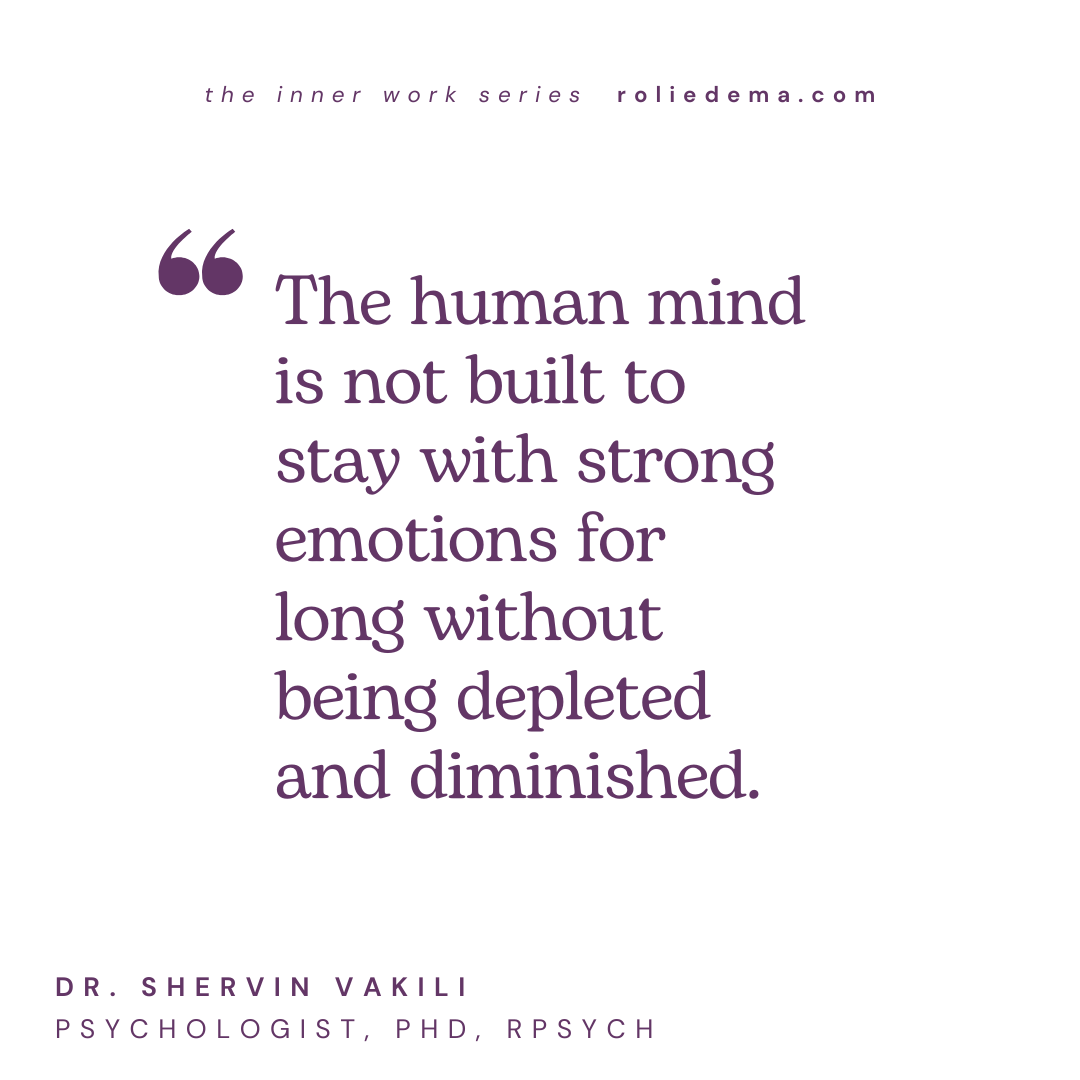- Home
- Think Pieces
- Interviews
- Inner Work Spotlight with Dr. Shervin Vakili
Inner Work with Dr. Shervin Vakili | What is Emotional Resilience?
In this spotlight interview, Calgary therapist Dr. Shervin Vakili shares unique insights on emotional resilience and making space for strong emotions.
Welcome to the first edition of The Inner Work Series: What Therapists Want You to Know, a collection of short interviews that feature grounded wisdom from real therapists.
Today I'm honoured to feature Dr. Shervin Vakili (Psychologist, PhD, RPsych), a Calgary Therapist who helps individual clients with ADHD, anxiety, and addictions concerns regain control over their lives.
Interview with Dr. Shervin Vakili, Calgary Therapist

Q1. What’s one mindset shift you often help your clients make?
Great question! The ability to switch mindsets is a very common and useful strategy that I use with many clients; in fact, it is one of the most effective ways to change your mood, motivation and outlook about many aspects of life.
However, I can’t say that there is a particular shift that I try with most clients.
My clients are concerned with many varied and deeply personal issues including health, finance, politics, careers, safety, meaning, and loss.
I can easily empathize with these concerns because they are shared by all human beings.
These concerns only turn problematic when we obsess about them and they become the focus of our minds, pushing out attention to things like success, joy, well-being, unity, achievements, friendships, family and passion.
A mindset shift is the ability to stop obsessively focusing on one issue or topic, no matter how important or central that issue is and acknowledge and honour mentally and emotionally uplifting issues to gain a better emotional balance.
The ability to shift our mindsets is the cornerstone of developing resilience.
It begins by acknowledging a problem and being able to either look for solutions if available or to be able to live with a problem without becoming consumed by it if solutions can’t be found.
Strong emotions drain our energy fast; the human mind is not built to stay with strong emotions for long without being depleted and diminished.
In fact, there are many conditions that are simply caused by an over-taxed brain shutting down and tuning out.
Old timers used to call it “having a breakdown”, now we have fancier terms.
Here are examples of some common and useful mindset shifts: learning to accept and embrace uncertainty, cultivating gratitude, practicing mindfulness, challenging old values and beliefs to make room for healthier ones.
So, the ability to shift our mindset is not about adopting a specific belief or attitude, but rather about developing the flexibility and openness to see things from different perspectives.
It’s about recognizing that we have the power to choose how we respond to life’s circumstances and that this choice can profoundly impact our emotional wellbeing and overall quality of life.
Q2. What’s one small habit or daily action that helps with emotional resilience?
Emotional resilience.
First, let’s dispel a common misconception: emotional resilience isn't about avoiding negative emotions.
It's about accepting both pain and suffering as natural parts of life alongside joy and happiness.
I would summarize resilience as the ability to accept internal or external challenges and to cope effectively.
There are numerous approaches and techniques available for learning acceptance and coping skills. The methods you may encounter can vary significantly depending on the type of therapist you consult.
We just talked about mindset shifts and how we can become victims of negative emotions when the emotion or what is causing it consumes our attention and focus.
I call this being stuck in the emotional or thought whirlwind.
For many of us when something or some thought greatly upsets us, our minds begin hyper-focusing on it.
This is the mind’s attempt to protect us by trying to understand and solve important problems.
But when a solution doesn’t present itself, the mind still has a tough time letting go.
In fact, the mind often doubles down on the rumination and focus because it’s still trying to protect us the only way it knows how.
It’s the mind’s way of saying:
“Hey, remember that thing that really bugged us, did you forget? Why haven’t you done anything about it? Huh? Remember how it went, ya I think you forgot, let me remind you….”
When we try to shift our focus or become solution focused, we find our mind ending up back where it started, and now we’re stuck in the whirlwind.
If you think about it, thoughts are like water; they’re very hard to guide, stop, or direct, especially when big emotions are present.
Ever find yourself having the same circular thought over and over, getting mad at yourself for having it, only to get back at it?
One very effective way of helping with this problem is journaling.
Journaling forces the run-on slippery thought to become a narrative on paper.
Little by little, a story takes shape that comes from within you, and is you, but once on paper it lives outside of you and outside of the whirlwind.
Putting our thoughts on paper can help increase self awareness.
I often have clients re-read something they wrote a week or a year ago and be totally surprised that they had found some brilliant solutions on their own when they were writing that they have now forgotten (being stuck back inside the whirlwind).
It often goes like this: ”Doc, you know that thing you were telling me to do last week?
Well, I found this journal I wrote five years ago and here I’m telling myself to do the exact same thing! I must have forgotten all about it!”
Q3. What’s one question you wish more people asked themselves (or their therapist)?
I think we can all reflect more on questions of priority. Hard times, strong emotions, grief, gripes and old wounds have a way of trapping our minds so that more important priorities and obligations in life are lost and forgotten.
Think of a depressed parent, shut off in their own mind, while their children play within eyesight, but miles away.
If other things don’t FEEL as important, then they must not be as important.
The purpose of emotions is to give us information about the world and then motivate us to act on it.
The more important and urgent the event, the stronger the emotion, the stronger the motive to focus on it and the brain conveniently shuts out everything else for us.
E.g. A bear is attacking me right now, I am VERY afraid.
Taxes, kids, family, and whether I’ll look silly if I scream are NOT being considered, and that’s how it should be and all is well.
But we can unwittingly grow emotions to much higher levels than they deserve, and the brain similarly shuts off all other priorities so we may be aware of them, but we’d not be motivated to act on them.
The question should always be, is this as important as I think it is?
And is this the most important thing in my life right now?
If you can use this technique and re-prioritize, along with using the resilience skills above, then you may resolve your issue.
But if you find the answer to both those questions to be yes for you, or even if no, but you just can’t unhook yourself from the emotion, then it would be a great idea to see a therapist.
Q4. Recommend a favorite resource:
If you’re over 40 and a very rational thinker, I would recommend Marcus Aurelius’ Meditations.
This book has particularly resonated well with some of my corporate leaders (Marcus was a Roman emperor after all!).
What’s more fun than reading a famous Roman Emperor’s daily journals and lessons to himself?
Stoic philosophy can be particularly thought provoking and helpful for rational minded people who want to understand and not fear mortality and refine their rules of conduct.
On the other side of the coin, if you are over 20 and a more emotional / sensory minded person, I would recommend reading Khalil Gibran’s “The Prophet”.
A beautifully written poetic novel giving profound life lessons about important aspects of life such as love, marriage, children, work, joy, sorrow and other practical things. A simple read with simple messages that will stick with you a lifetime.
Breaking bad habits and building healthy ones are both difficult and a cornerstone of the work I do with many patients, but in particular anyone with ADHD or struggling with addictions.
I like the book Atomic Habits by James Clear. He makes many psychologically based and verified ways to set and create habits in easy to understand steps and uses many useful examples that will help understand the how and the why. A good read for any age group.
Q5. What’s one myth about therapy you’d love to bust?
The myth that if you go to therapy, you must be either crazy or weak.
It’s the number one stigmatizing opinion that keeps parents from taking their kids to therapy or keeps adults (usually from my generation or older) from going to therapy.
I’m glad to see the newer generation’s attitude shift that has happened.
I have more patients now who come in saying they don’t have a particular issue but just want more self-awareness and tools and see therapy as a valuable tool towards self-discovery and improvement.
There is a form of therapy and type of therapist to suit any person and any condition.
No therapist fits all personalities and can work with all conditions.
It may take a bit of trial and error, but when you find the right fit, you’ll know it within one or two sessions.
Find Dr. Vakili
Enjoyed reading Dr. Vakili's insights and answers to the above questions? Please visit Dr. Vakili's website, ourtherapist.com, to connect with Dr. Vakili and learn more about his work.
Thanks for reading! If you liked this content, share with a friend:
Recent Articles
-
5 Things to Stop Doing If You Want to Feel More Fulfilled
Feb 21, 26 05:35 PM
Are you unintentionally engaging in behaviours that leave you feeling depleted and empty? Here are 5 things to stop doing if you want to feel more fulfilled. -
5 Subtle Habits That Quietly Transform Your Life Over Time
Jan 25, 26 08:21 PM
Progress towards the things that matter isn't usually loud or dramatic. Here are 5 subtle habits that quietly transform your life over time. -
Inner Work with Marcus Lynn | How to Make Change More Realistic
Jan 19, 26 06:24 PM
In this spotlight interview, therapist Marcus Lynn explains how we can begin to see emotions as information and make change more realistic in our lives.









